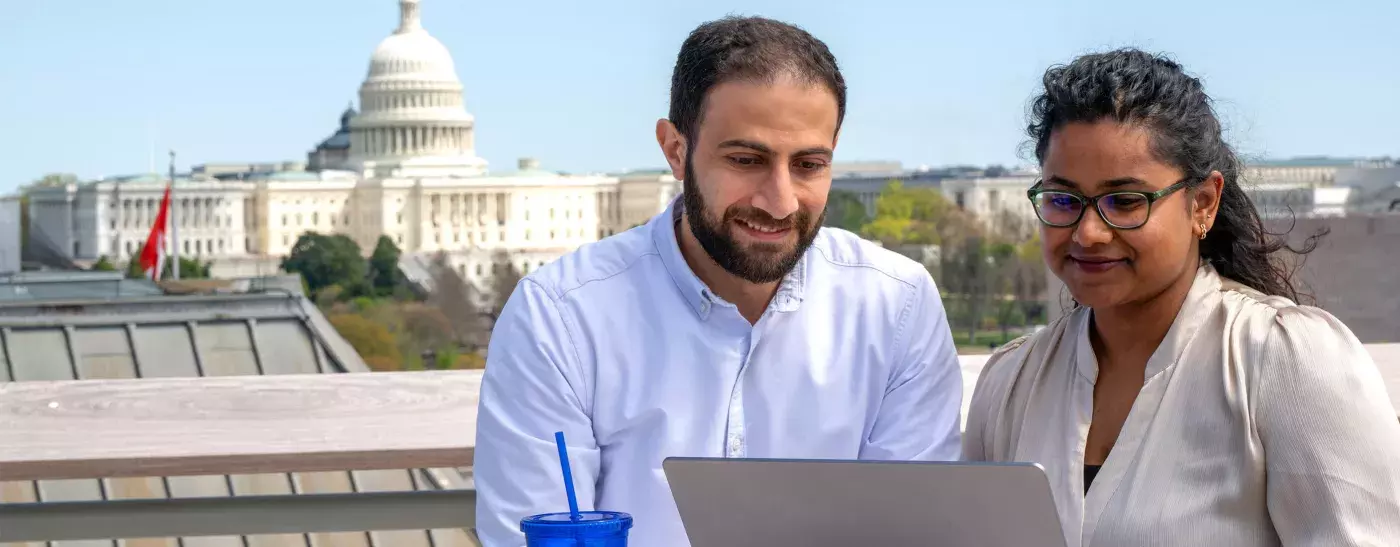Search
Q&A: COVID-19 pandemic poses risk of recession
Hiring international students
Hiring international students

Corporate and Strategic Partnerships
Information about hiring international students
In order to build for what’s next in the global economy, companies need the best talent available. Opening your jobs and internships to international students will significantly broaden your pool of highly skilled talent.
Obtaining permission for international students to work in the U.S. is not as difficult as many employers think. Most international students are in the U.S. on non-immigrant student visas (F-1), and these international students are eligible to accept employment under certain conditions. Johns Hopkins Carey Business School has many STEM designated programs as well, allowing students who meet certain criteria to work in the U.S. for an extended time period.
Myths and facts
Fact: False. Hiring through the OPT program costs the same as hiring a U.S. citizen. In fact, you may save money; most international students are exempt from Social Security (FICA) and Medicare tax requirements.
Fact: False. No additional work is required of the employer. All you must do is provide an offer letter, just as you would for a domestic job applicant.
Fact: False. International students with STEM-designated degrees are eligible to work in the US for up to three years post-graduation on their F-1 visas through OPT (Optional Practical Training).
FAQs
-
No. Federal regulations permit the employment of international students on F-1 and J-1 visas within certain limits. These visas allow students to work in jobs related to their major field of study. F-1 students can work on “practical training.” J-1 students may work on “academic training.”
-
No. The only cost to the employer hiring international students is the time and effort to interview and select the best candidate for the job. The international student office handles the paperwork involved in securing the work authorization for F-1 and J-1 students. In fact, a company may save money by hiring international students because the majority of them are exempt from Social Security (FICA) and Medicare tax requirements.
-
F-1 students are eligible for CPT before completing their studies, as well as an additional 12 months of OPT, either before or following graduation, or a combination of the two. However, if they work full-time for one year or more of CPT, they are not eligible for OPT. Students with a J-1 visa are usually eligible to work up to 18 months following graduation. They may also be eligible to work part-time during their program of study. Staff in the International Student Office on campus will evaluate each student’s situation to determine the length of time for which they are eligible to work.
-
No. International students must have the work authorization before they begin actual employment, but not before they are offered employment. In fact, J-1 students applying for academic training and F-1 students applying for CPT must have a written job offer in order to apply for the work authorization. Many F-1 students will be in the process of obtaining work authorization pursuant to the requirements of OPT while they are interviewing for employment. Students can give employers a reasonable estimate of when they expect to receive work authorization.
-
For OPT, F-1 students receive an Employment Authorization Document, a small photo identity card that indicates the dates for which they are permitted to work. from BCIS. For CPT, F-1 students receive authorization from the school (NOT from BCIS) on page three of the student’s I-20. “No service endorsement is necessary” –per 8CFR 274a.12 (b) (6) (iii). J-1 students receive work authorization in the form of a letter issued by the RO or ARO at their institution.
-
With a bit of planning ahead, an employer can hire international students to continue to work for them in the H-1B visa category for a total of six years (authorization is granted in two three-year periods). The H-1B is a temporary working visa for workers in a “specialty occupation.” The application procedure to the BCIS is straightforward. The job must meet two basic requirements:
- The salary must meet the prevailing wage as defined by the Department of Labor.
- A bachelor’s degree is a minimum normal requirement for the position.
-
No. American employers are not required to document that a citizen of another country did not take a job from a qualified U.S. citizen if the non-U.S. citizen is working under a F-1, J-1 or H-1B visa. Employers must document that they did not turn down a qualified American applicant for the position only when they wish to hire foreign citizens on a permanent basis and sponsor them for a permanent resident status (green card).
-
Normally, if the internship involves no form of compensation and is truly voluntary, the students may volunteer without having to do any paperwork with the BCIS. If, however, the internship provides a stipend or any compensation, students must obtain permission for practical training or academic training prior to starting their internship. Student should check with their employers to ensure that the company is allowed by law to offer unpaid internships.
-
Unless exempted by a tax treaty, F-1 and J-1 students earning income under practical training are subject to applicable federal, state, and local income taxes. Information on tax treaties may be found in IRS Publication 519, U.S. Tax Guide for Aliens, and 901, U.S. Tax Treaties.
Generally, F-1 and J-1 students are exempted from social security and Medicare tax requirements. However, if F-1 and J-1 students are considered “resident aliens” for income tax purposes, social security and Medicare taxes should be withheld. Chapter 1 of IRS Publication 519, U.S. Tax Guide for Aliens explains how to determine the residency status of international students.
More information on social security and Medicare taxes can be found in Chapter 8 of IRS Publication 519, U.S. Tax Guide for Aliens and in Section 940 of Social Security Administration Publication No. 65-008, Social Security Handbook.
For your reference: code of federal regulations
The Code of Federal Regulations Title 8 and Title 22 citation numbers for regulations governing practical training are as follows:
- F-1 students: 8CFR 214.2 (f) (9) & (10)
- J-1 students: 22CFR 62.23 (f)
CFR Title 8 citations governing IRCA requirements are:
- F-1 students: 8CFR 27 4a. 12(b) (6) (iii) and 8CFR 274a. 12(c) (3) (i)
- J-1 students: 8CFR 27 4a. 12 (b) (11)
Copies of the Code of Federal Regulations are available from the Superintendent of Documents in Washington DC or from the website: http://www.gpoaccess.gov/cfr/index/html
The original unmodified document was published in 2000 with a grant from NAFSA: Association of International Educators Region XII. 2004 revision by Laurie Cox, University of Southern California, and Co-Chair of SCICC (Southern California International Careers Consortium); coeditors: Lay Tuan Tan, California State University Fullerton, and SCICC Board member and Phil Hofer, University of La Verne.
Internship U.S. work authorization
Students studying in the U.S. in F-1 status may be authorized through CPT to work off-campus, in jobs or internships related to their course of study, during their academic program. These candidates are eligible to work and collect compensation. Hiring a student on F-1 status requires minimal considerations on the part of the employer. Employers need only provide an offer letter containing certain criteria on company letterhead to the student.
After graduation U.S. work authorization
International student graduates can be authorized to work in the U.S. for 12 months through OPT. There are no considerations or expenses on the part of the employer to hire someone through OPT.
Eligible graduates who have completed at STEM designated degree (full-time MBA, MS Information Systems, MS Finance, MS Business Analytics Risk Management) are eligible for an extended OPT period, under certain conditions.
For information on the STEM extension.
Practical training and F-1 students
Practical training is a legal means by which F-1 students can obtain employment in areas related to their academic field of study. Students, in general, must have completed one academic year (approximately nine months) in F-1 status and must maintain their F-1 status to be eligible for practical training. There are two types of practical training:
Optional practical training
Optional Practical Training must be authorized by the Bureau of Citizenship and Immigration Services based on a recommendation from the designated school official in the International Student Office of the school which issued the form I-20, a government document which verifies the student’s admission to that institution. The term “optional” means that students can opt to use all or part of their total practical training allotment of a maximum of 12 months. OPT can be authorized by the BCIS, and generally students can work 12 months of practical training after completing their program of study. It should be noted that for BCIS purposes, students working anything more than 20 hours/week will be considered full-time. Students who have received OPT permission will be issued an Employment Authorization Document by the BCIS. Their name, photo and valid dates of employment are printed on the EAD. Employers should note that average processing time for BCIS to issue the EAD is two or three months, and students may begin employment only after they receive the EAD which will indicate the starting and ending dates of employment.
Curricular practical training
Curricular Practical Training may be authorized by the institution (not by BCIS) for F-1 students participating in curricular-related employment such as cooperative education, alternate work/study, practicum, and internship programs. This work experience must be deemed an integral part of an established curriculum in the student’s course of study. Authorization is written on page three of the I-20 student copy and will include the name of the company, address and zip code, beginning and ending date, and signature of the designated school official in the International Student Office. Since each institution has different policies related to curricular-related employment, students should speak to the DSO at their institution. Processing time for the authorization of CPT varies at each institution. Employers should check with the student’s institution for an approximate turnaround time.
Minimal paperwork for the employer
There is little paperwork for an employer who hires F-1 or J-1 students. All paperwork is handled by the students, the school, and the BCIS. For CPT, the school will make a notation on the students’ copy of the I-20 form indicating that CPT has been authorized and specifying the duration and place of employment. Students authorized for OPT are required to apply to BCIS (through the International Student Office of the school) for an Employment Authorization Document.
Continuing employment after the practical/academic training period
Federal regulations require that employment terminates at the conclusion of the authorized practical or academic training. However, students on an F-1 visa, or students on a J-1 visa who are not subject to a two-year home residency requirement, may continue to be employed, if they receive approval for a change in visa category-usually to H-1B. Students must have a minimum of a bachelor’s degree in order to qualify for H-1B status.
Individuals may work in the U.S. for a maximum of six years under an H-1 B visa. This visa is valid only for employment with the company that petitioned for them. They must re-apply to the BCIS if they wish to change employers. As soon as the initial job offer is made, they should petition for an H-1B visa if employment is likely to extend beyond the practical training period.
Questions about hiring Carey students?
Concentration of larger builders means less new or affordable housing
Master of Science in Information Systems and Artificial Intelligence for Business (part-time)
Master of Science in Information Systems and Artificial Intelligence for Business (part-time)

The STEM-designated Master of Science in Information Systems program places you at the nexus of business, technology, and human behavior to find breakthrough business strategies. Students of all technical levels leverage the art and science of information systems for transformative organizational impact.
Harness the power of information systems to drive your organization’s success in the global marketplace. The MS in Information Systems program bridges technology and business with a curriculum covering big data, predictive analytics, AI, machine learning, cybersecurity, and more. Gain hands-on experience in web services and IT, and graduate ready to lead your organization’s business solutions.
Program details
Financial Aid & Scholarships
Program features
Hybrid format
The flexible format allows you to complete the program with both online courses and three required in-person residencies.
Technical framework
Master AI and machine learning to stay ahead in the fast-changing digital landscape. Gain the tools needed to lead innovation, drive organizational success, and elevate your career in the global marketplace.
AI foundations
Design effective human-AI collaboration strategies and build frameworks that deliver real-world, AI-driven solutions. Graduate prepared to lead ethical and responsible AI deployment across industries.
Cutting-edge skills in AI
Bridge technology and business with a comprehensive curriculum focused on cloud computing, machine learning, deep learning, generative AI, and real-world business applications.
At Johns Hopkins Carey Business School, our MBA and specialized Master of Science programs are designed for students to advance business skills and thrive in the rapidly changing global market.
Curriculum
The part-time Master of Science in Information Systems and Artificial Intelligence for Business curriculum blends AI-driven technology, business strategy, and human behavior. Designed for today's evolving industries, the program covers topic like machine learning and generative AI, and their real-world applications. Graduate with the technical skills and strategic insight to lead innovation and stand out in a competitive global market.

"My degree from Carey has profoundly influenced my career, equipping me with a strategic blend of technical and leadership skills that are essential in today’s AI-driven landscape."
Tianli Xu '23,
Research Technology Lead, Johns Hopkins Carey Business School
The latest edition of the Carey Business School University Catalog is available.
-
Artificial intelligence and information systems are transforming the way we live and work, driving innovation across every industry. As technology evolves at a rapid pace, businesses need forward-thinking leaders with the expertise to harness AI's potential and identify opportunities for greater business value.
The part-time Master of Science in Information Systems and Artificial Intelligence for Business program will equip you to lead AI-driven IT initiatives, ensuring security, strategic advantages, and long-term success in an increasingly digital world.
Required courses (16 credits):
Business foundations (6 credits)
- BU.120.601 Business Communication
- BU.131.601 Business Leadership and Human Values
- BU.510.601 Statistical Analysis
Functional core (10 credits)
- BU.520.710 AI Essential for Business
- BU.330.705 Cyber Networks: Securing the Digital Frontier
- BU.350.620 Digital Transformation of Business
- BU.330.740 Large Scale Computing on the Cloud
- BU.330.775 Machine Learning: Design and Deployment
Electives (14 credits)
Choose seven courses from the following:
- BU.520.750 AI-Driven Sequential Decision Making
- BU.210.620 Accounting and Financial Reporting
- BU.520.620 Advanced Business Analytics
- BU.330.785 Advanced Database Management
- BU.330.750 AI Development and Business Applications
- BU.520.601 Business Analytics
- BU.610.705 Crisis Management
- BU.330.730 Cybersecurity
- BU.510.650 Data Analytics
- BU.330.780 Data Science and Business Intelligence
- BU.520.650 Data Visualization
- BU.330.770 Database Management with SQL
- BU.300.700 Developing Internet Systems and Services
- BU.330.760 Generative AI
- BU.883.702 Health Information Technology
- BU.330.765 Human-AI Fusion for Business
- BU.350.700 Introduction to Programming with Java
- BU.300.62 Managing Complex Projects
- BU.410.620 Marketing Management
- BU.680.620 Operations Management
- BU.510.615 Python for Data Analysis
- BU.330.735 Responsible AI
- BU.610.615 Simulation for Business Applications
- BU.450.765 Social Media Analytics
- Carey elective of choice
-
Residencies are held during the spring and fall semesters in Washington, D.C. You can explore Carey’s Washington, D.C. location through our virtual tour. The residencies include:
- Digital Transformation of Business: September 2025 (Second week of Fall I)
- AI Essentials for Business: March 2026 (First week of Spring II)
- Business Communication: Fall 2026 (Dates TBD)
Program Comparison
- Hybrid format, 2 years, online and in Washington, D.C.
- Working professionals, upskilling, pivoting mid-career
- Emphasis on machine learning, AI, and data science
- Three in-person residencies
- Fully online, 2 years
- Working professionals, upskilling, pivoting mid-career
- Specialized knowledge in technology and artificial intelligence
- Quantitative and leadership skills
Signature experiences
Your business education doesn’t end in the classroom. Step out of your comfort zone as you partner with students across Johns Hopkins and businesses to take your learning to the next level.
-
Learn more about Career & Life Design
Throughout your program and beyond, Carey career and leadership coaches and employer relations industry specialists provide you with the support, resources, and opportunities you need to achieve your unique career goals.
Whether you're looking to advance in consulting, finance, management, operations, or logistics, this program equips you with the skills and leadership tools necessary to succeed. Graduates of this program will be well-prepared for a variety of roles, including:
Titles (sample)
- Data Analyst
- Data Scientist
- Business Analyst
- Business Operations Analyst
- IT/AI Consultant
- Financial Analyst
- Full-stack Developer
- Software Developer
- Machine Learning Engineer
- AI Product Manager
- Business Intelligence Developer
- AI Solution Architect
- AI/Machine Learning Operations Engineer
Attend an event
Carey Business School hosts various virtual admissions events for prospective students to meet with members of our admissions team. With virtual visits, informational online sessions, and regional and international events, the Carey team is ready to answer questions and support your business school journey.
Connect with a Carey student or alum
Our students come from all over the world and represent all of the different graduate business programs we have here at Carey. Connect with one of them directly to learn more about life at Carey.
MIINT Impact Investing Program
MIINT Impact Investing Program

Student Experience
MBA Impact Investing Network and Training
Are you ready to think like an impact investor?

MIINT is a rigorous program that offers a variety of training modules and online resources for students to gain exposure to the world of impact investing.
Carey students have the opportunity to audit the MIINT program and take part in asynchronous and live workshops on impact investing, investment strategy, sourcing early-stage investments, conducting due diligence, and assessing terms and structures of investments.
The MIINT program provides valuable benefits for business students and innovative, mission-driven companies.
“With only a small understanding of investments, my team was able to gain hands-on experience while developing our thesis by reaching out to different organizations and individuals. Industry mentors provided us with guidance throughout the experience and trained our group in specific topics like biases in investing. It was great to learn and create plans to mitigate those biases and learn so much about impact investing.”
Rhianna Taniguchi, MBA ‘23
MIINT Impact Investing Program
- The program runs from mid-October through March, and Carey students can audit the online program.
- Participate in asynchronous impact investing training modules throughout the year, with the opportunity to join the live workshops.
- Communicate and learn from each other through online trainings, discussions, and network-wide calls.
- Build a network with business students from the top business schools across the country.
- Carey supports the student registration fee; contact Carey_Partnerships@jh.edu for more information.
Master of Science in Real Estate and Infrastructure (part-time)
Master of Science in Real Estate and Infrastructure (part-time)

Johns Hopkins Master’s in Real Estate and Infrastructure courses are taken within a true business school. Learn alongside students and faculty of different industries and backgrounds with like business mindsets, through the Edward St. John Real Estate Program. Build multidisciplinary skills that will help you thrive in and out of real estate, regardless of market conditions.
Johns Hopkins Carey Business School’s part-time Master of Science in Real Estate and Infrastructure program has been a leader in real estate education for more than 20 years. The flexible format provides working professionals with the option of remote live, synchronous courses to continue to maintain your career. Our innovative curriculum delivers additional flexibility in selecting courses for a customized focus on specific real estate topics including health care real estate, contemporary issues in the industry, and negotiation.
Program details
Financial Aid & Scholarships
Program Features
Networking opportunities
Leverage the power of our alumni network and forge meaningful, lasting connections with real estate professionals who bring deep industry experience and a shared commitment to helping you grow, lead, and build for what’s next®.
Flexible format
The fully online, flexible format allows you to complete the program while continuing your personal and professional obligations. Create a schedule that works for you and customize your electives to align with your career goals.
Edward St. John Real Estate Program
This program is made possible by the generous support of Edward St. John, a real estate visionary committed to shaping the future of the built environment. Learn fresh, innovative approaches to real estate development.
Relevant, practical, and applicable
Gain insights from expert faculty and adjunct practitioners who are leaders and innovators that bring real-world expertise directly into the classroom.
-
Real Estate and Infrastructure New York City Trek
Carey students, faculty, and staff from the Real Estate and Infrastructure program traveled to New York City in January 2024 for the Real Estate and Infrastructure annual experiential learning trek. The trip included visits to 3 World Trade Center, the New York Stock Exchange, and W.P. Carey for tours of the facilities. Read more“The New York City trip helped overcome the main challenge of being a part-time, remote student–connecting with other students, faculty, and staff. It was an added bonus to discuss things like electives. I left the trip feeling more connected to the school, faculty, and staff, with an even greater sense of pride in the program. The trip was well-organized, and I’m thankful for the opportunity to participate.”
– Bentley Sam '25, Manager, Real Estate at Norfolk Southern
-
- Collect, read, and analyze real estate data
- Understand zoning regulations and anticipate changes to land use laws
- Understand pertinent mega-trends and engage at the frontiers of real estate
- Influence the direction of development
- Build your personal and professional real estate network
-
- 38% female / 63% male
- 3.24 average undergraduate GPA
- 8.3 average years of full-time work experience
- 1 country represented
- 30 average age
With help from faculty experts, a curriculum focused on functional skills, and a hands-on learning experience, Chris Agorsor (Real Estate and Infrastructure ’17) was able to directly apply his skills from Carey to position his company to take on $2 billion in funds. Hear how the Real Estate and Infrastructure program prepared him.
Curriculum
For over 30 years, the Edward St. John Real Estate Program at Johns Hopkins Carey Business School has featured a powerful combination of research-focused faculty members and practitioners who are leading experts in their fields. The part-time Real Estate and Infrastructure program features an in-person residency of your choice to gain hands-on experience and networking opportunities with your peers, Johns Hopkins alumni, and experts in the industry.
The latest edition of the Carey Business School University Catalog is available.
-
The part-time Master of Science in Real Estate and Infrastructure program is built on the pillars of data, decision-making, policy, and community. These foundations empower real estate professionals and entrepreneurs across all career stages. Whether you're deepening your expertise or transitioning from a related field, this program prepares you to anticipate market shifts, influence policy, and make a meaningful impact on the communities you serve. Stay ahead of the industry with a forward-looking curriculum that explores the key trends shaping real estate today. The part-time program prepares future leaders and change-makers to drive what comes next.
Those trends include:
- Affordable housing
- Sustainability in real estate (green building, zero carbon, zero emissions)
- Climate resilience
- Financing (private equity, crowdfunding)
- Data (accessibility)
- Participatory governance
- Tax and regulation (regulatory changes to close loopholes)
Curriculum features:
- Core real estate classes and future-focused real estate electives
- Capstone project to apply classroom knowledge to real-world challenges
- Case studies in partnership with the Johns Hopkins alumni community, including companies like Fannie Mae, Angelo Gordon, and Hillwood Properties
- Experiential learning courses featuring a part-time internship with a local or national real estate firm
Fast Track Certifications:
- Argus
- CCIM
- LEED
- WELL
- Appraisal Institute
Required courses (16 credits):
Business Foundations (3 courses, 6 credits)
- BU.120.601 Business Communication
- BU.131.601 Business Leadership and Human Values
- BU.510.601 Statistical Analysis
Functional Core (5 courses, 10 credits)
- BU.241.620 Design and Construction Feasibility
- BU.241.745 Fundamentals of Real Estate Valuation and Investment
- BU.245.790 Real Estate and Infrastructure Capstone
- BU.242.601 Real Estate Market Feasibility Study
- BU.241.630 Real Estate Products and Emerging Trends
Elective courses (Choose 7 courses, 14 credits):
- BU.241.750 Advanced Valuation and Investment Analysis
- BU.152.740 CityLab Catalyst: Business Innovation for Social Impactᅠ
- BU.152.745 CityLab Practicum: Social Impact Projectᅠ
- BU.241.725 Global Perspectives in Real Estateᅠ
- BU.241.780 Health Care Real Estate
- BU.241.735 Infrastructure Development for Sustainable Cities
- BU.241.640 Net Zero Real Estate
- BU.241.740 Project Finance & Public-Private Infrastructure Delivery
- BU.242.720 Real Estate Capital Market Analysis
- BU.242.710 Real Estate Funds and Portfolio Management
- BU.241.610 Real Estate Investment and Development
- BU.242.701 Real Estate Investment Trusts: Analysis and Structuring
- BU.241.705 Selected Topics in the Real Estate Industry
- BU.241.770 Smart Growth, Infrastructure and Real Estate Development
- BU.241.760 Strategic Commercial Leasing
- BU.241.650 The Evolution of Housing, Property, and Public Finance Policy
- BU.241.625 The Legal and Public Policy Landscape of Real Estate
- Carey Elective of Choice
Optional Residency
Participate in an optional residency of your choice to gain experience working alongside experts in the industry.
Program Comparison
- Fully online, 2 years
- Working professionals, career switchers, leadership development
- Optional residency of your choice
- Focus on alternative real estate, real estate infrastructure, finance, and sustainability
- Fully online, 2-6 years with optional in-person experiences
- Working professionals, career switchers, leadership development
- Broader business foundations in leadership, marketing, AI, finance, operations
- Customizable with choice of eight specializations
-
Gain hands-on experience and networking opportunities with Johns Hopkins alumni and experts in the industry.
Residencies typically feature:
- Conferences or summits on important real estate topics such as real estate health care, real estate technology (Prop tech), and community investing and affordable housing
- A visit with a city planning or economic development department to explore strategic planning, data collection and analysis, and how to connect urban planning with community macro issues (crime, employment, property values, health, etc.)
- Projects like preparing a plan for a failing development and presenting it to a planning department
Go beyond the classroom
Your business education doesn’t end in the classroom. Step out of your comfort zone as you partner with students across Johns Hopkins and businesses to take your learning to the next level.
-
Throughout your program and beyond, Carey career and leadership coaches and employer relations industry specialists provide you with the support, resources, and opportunities you need to achieve your unique career goals.
Explore career outcomes of our MS in Real Estate and Infrastructure alumni
- Acquisitions analyst for universal owners (endowments, foundations, sovereign wealth funds)
- Asset manager
- Associate for private equity
- Director of development - private sector
- Director of environmental social governance (ESG) for a real estate investment trust (REIT)
- Director of finance/development - public sector (county/state level)
- Loan originations and servicing
- Real estate development
- Real estate entrepreneurship
- Sales/leasing/property management for investors
Networking opportunities
Alumni from the Johns Hopkins Real Estate and Infrastructure program are a powerful and extensive network of 1,000+ members who want to help you succeed.
- Real Estate and Infrastructure Advisory Board: Members of the Real Estate and Infrastructure Advisory Board help continually evaluate and update our curriculum to account for the latest real estate trends. They also serve as guest speakers in the program to offer insights and networking opportunities from influential real estate practitioners at real estate firms.
- Alumni forum: The Johns Hopkins Carey Business School Real Estate Alumni Forum—known as Carey REAF—promotes and facilitates relationship building between students, alumni, faculty, Advisory Board members, and real estate industry leaders. The group holds educational and social events, and opens opportunities for events hosted by local, regional, and national real estate professional organizations.
Keep up to date with the MS Real Estate and Infrastructure program
- Quarterly JHU Real Estate Market Update Newsletter: A quarterly market report newsletter for our alumni, from leading commercial real estate firms about real estate finance, capital markets, and the real estate economy. (coming soon)
- What’s Next in Real Estate Speaker Series: An ongoing series focused on challenges, uncertainties, or innovations in the real estate industry. Dean Alex Triantis facilitates each event, featuring distinguished Carey alumni and industry leaders.
Attend an event
Carey Business School offers admissions events for prospective students to connect with our admissions team. Through online sessions and in-person regional events, the Carey team is here to answer your questions and support your business school journey.
Connect with a Carey student or alum
Our students come from all over the world and represent all of the different graduate business programs we have here at Carey. Connect with one of them directly to learn more about life at Carey.
How to apply: Non-degree
How to apply: Non-degree

Admissions
Application requirements for non-degree programs
We can’t wait for you to join our vibrant learning community and to build for what’s next together.
Our non-degree programs allow you to take a select number of courses for credit at Johns Hopkins Carey Business School. This provides an opportunity for you to explore the curriculum and experience graduate-level coursework before committing to a full degree program, or simply to take a few courses that interest you without pursuing a degree.
Eligibility for a non-degree program
- Non-degree applicants to the Carey Business School must hold a bachelor's degree from an accredited college or university.
- Non-degree students may enroll in a maximum of three courses (six credits) while classified as a non-degree student.
- Non-degree students are eligible to register for courses offered in the online modality format, based on seat availability.
- Non-degree students are unable to register for any in-person courses, independent credits, global immersion, capstone courses, and any online courses restricted to degree seeking students.
- Non-degree students will be held to the same grading and academic integrity standards as degree-seeking students.
- Up to six credits earned as a non-degree student may be applied toward a part-time or online degree program, contingent on admission and program-specific requirements.
Please review the instructions below to prepare your application for one of our non-degree programs or click the button below to start your application.
Apply Today
Application requirements
-
Begin and manage your application by creating your username and password on the Johns Hopkins University-wide platform.
- Choose "Carey Business School" as your school of choice.
- You can begin your application, save it, and return to finish it at a later time by logging in at your convenience.
- Your application will not be evaluated until all supporting materials are received.
- Use Google Chrome for the best user experience while completing your application.
-
When choosing a course term, be sure to review our application and enrollment form deadlines to secure your place in the class. As a general policy, we do not offer extensions, so we recommend applying when you’re confident you’ll be ready to make your enrollment decision.
2026 application deadlines
Course term Application deadline Decision deadline Enrollment form deadline Spring 2026 January 8, 2026 Rolling January 15, 2026 Fall 2026 August 12, 2026 Rolling August 19, 2026 Summer TBD Rolling TBD
-
Official transcripts from all U.S. schools must be sent electronically. All U.S. transcripts must be from an accredited institution recognized by the Department of Education. Please visit your school’s website to request an official transcript be sent electronically to carey.admissions.transcripts@jhu.edu.
We require transcripts from all institutions where you have attempted more than 15 credits. Final transcripts must show the degrees you have earned. Your admission decision may be delayed if you do not send transcripts from all colleges/universities attended. If your transcripts are from a non-U.S. school, please review the "additional requirements for the non-U.S. applicants" section below for information about the required course-by-course credential evaluation process.
If your school does not participate in an electronic transcript submission system, please send official sealed transcripts to the address below:
Johns Hopkins Carey Business School
Office of Admissions
100 International Drive
Baltimore, MD 21202
-
Please submit a copy of your government issued ID.
-
We require a one-page résumé that highlights your academic background and professional experience in a clear, concise, and results-oriented format. Your résumé should be organized in reverse chronological order and include both the months and years for each position or internship.
We recommend emphasizing your quantifiable achievements, demonstrated leadership, and impact—rather than simply listing job responsibilities. Tailor your résumé for business school by showcasing contributions that reflect your potential as an MBA candidate.
Your résumé should complement, not duplicate, your essays and application. Use it to showcase the broader story of your career progression, decision-making, and readiness for graduate study.
Use clear section headings, professional font (10–12 points), and consistent formatting throughout. Be sure to proofread carefully to eliminate any spelling or grammatical errors. This is your opportunity to provide the admissions committee with a concise snapshot of who you are and the impact you’ve made—make it count.
-
Please submit a statement of purpose explaining why you wish to enroll in a specific course and how that course–and Carey–aligns with your professional goals.
-
The application fee will be waived for non-degree applicants.
- Non-degree students will pay tuition at the standard per-credit-hour rate for graduate courses.
- Non-degree students are not eligible for federal financial aid or institutional scholarships.
- Tuition refunds for withdrawals will follow the standard institutional refund policy.
Questions?
Please contact Shannon Dunn at shannondunn@jhu.edu if you have additional questions or need more information to complete your Carey Business School application.



